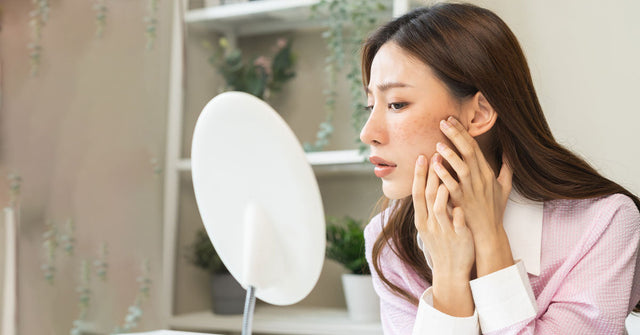The skin goes through many transformations with age, as does the rest of the body, and skin care for seniors must take into account these changes to keep the complexion as healthy as possible.
As we get older, the skin becomes looser and thinner, develops signs of age like wrinkles and fine lines, and may be more prone to dryness and certain skin conditions. Older people often develop issues like skin tags and age spots, sometimes due to sun damage over the years.
In this article, we’ll describe common skin issues, and provide you with lifestyle and tips for skin care elderly people should know to keep their complexion healthy and vibrant for years to come.
What You Should Know About Aging Skin
Over the years our skin loses collagen and elastin. As these key proteins keep the complexion firm and elastic, this may lead to sagging, loose skin, wrinkles, and lines on your complexion. The skin also becomes thinner and more vulnerable with age so it’s more prone to tearing and other damage.
Levels of super hydrating hyaluronic acid in the skin also decline with time, which could cause dehydration. In addition, loss of volume in the sweat and oil glands in older people can contribute to dry skin.
Cellular renewal also slows as we get older, which is triggered by the loss of collagen and elastin. This means dead skin cells get replaced less often, leading to a loss in skin radiance. Depending on how much sun damage your complexion has endured over the years, you may develop age spots and hyperpigmentation, skin tags, or even melanoma.
Common Skin Issues For the Elderly
The impact of the changes that occur in the skin over time makes older people vulnerable to many skin issues. While you may be prone to some of these concerns, know that there are lifestyle and geriatric skin care solutions that can make a significant difference in keeping your complexion healthy for years. Common elderly skin problems include:
- Dry, flaky skin
- Dull, lusterless complexion
- Age spots and hyperpigmentation
- Loss of elasticity
- Wrinkles and fine lines
- Skin tags
- Bruising easily
- Tears in the skin
- Bacterial and viral skin conditions
- Skin cancer
- Skin conditions involving irritation and itchiness like eczema or pruritis
- Rough patches called seborrheic keratoses (warts)
- Shingles, a blistering rash that also affects the nervous system
How to Keep Skin Healthy for Older Adults
When it comes to skin care in the elderly, some modifications in products and daily routines are recommended for optimal skin health. While you should continue to cleanse, use toner, exfoliate a couple of times a week, moisturize, and apply sunscreen, a gentle skin care for the elderly should also have products to address new concerns.
After 50, we recommend that you use an anti-aging serum or cream following your toner to boost collagen and elastin levels. This should tighten, improve elasticity, and smooth lines and wrinkles on the complexion. These formulas are usually high in antioxidants which repair skin barrier damage and protect from environmental agents like UV rays. A good product will also have anti-inflammatory agents to reduce redness and irritation and heal skin conditions.
The skin around the eyes is thin and prone to damage, so add an anti-aging eye cream to your skincare routine to boost hydration, tighten, and reduce issues like crow’s feet, puffiness, bags, and dark circles.
If you are wondering how to take care of your elderly skin outside of following a consistent daily routine, improving your lifestyle habits can make a significant difference. This includes following a healthy diet rich in nutrients, exercising regularly to improve circulation to the skin, staying hydrated, and keeping your stress levels in check.
How to Choose Skincare Products For Aging Skin
Skin care in elderly people should be gentle and free of harsh ingredients that could lead to irritation and exacerbate existing issues. Look for all-natural products which are hypoallergenic and free of parabens, sulfates, artificial fragrances, or dyes. In addition, choose formulas that are non-comedogenic, meaning they won’t clog the pores.
The Solvaderm collection includes rich, completely natural formulas which deeply hydrate, eliminate signs of age, boost cellular renewal and repair, and promote a healthy, vibrant complexion. For optimal skin care, elderly people should look through categories like Aging Skin, Serums and Treatments, Moisturizers, Hyperpigmentation, and more.
Some of the products we recommend the most highly for older skin include Glowpeel dermal repair serum, the gentle, antioxidant-rich cleanser Dermpura, and the deeply hydrating moisturizer Infusoderm.
Most Common Skin Complaints in the Elderly
Due to the decline in collagen, elastin, and hyaluronic acid levels with age, elderly people often complain about dry, flaky skin, sagging, and other signs of age like wrinkles and fine lines. This can be exacerbated by UV skin damage and may lead to age spots, hyperpigmentation, warts, and skin tags.
Elderly skin is thinner and more vulnerable, so older people may find that their skin bruises and tears easily. Older individuals are also more prone to certain skin conditions like eczema, pruritis, shingles, and bacterial or viral infections.
Best Elderly Skin Care Tips
In addition to the skin care for senior recommendations we have already offered, these are some highly effective tips to improve skin health in older adults:
- Avoid long baths or switch to showers, and limit your time to 5 minutes as excess bathing could damage the skin. Aim for a lukewarm temperature as well, since hot water may cause burns, dryness, or irritation, which works against skin care for elderly.
- If you smoke, try to quit or cut down, as the smoke deprives the skin of oxygen, promotes premature aging, and decreases hydration.
- Make sure you drink adequate water daily to maintain skin hydration and stave off dryness. Aim for at least 8 glasses for a healthier, more vibrant complexion.
- Get a good sleep, as your skin produces collagen at night which tightens the skin. Less sleep may mean more wrinkles and fine lines over time.
FAQs
Do you need a different skincare routine as you age?
Yes, you do need a different skincare routine as you age. While the basic steps of cleansing, toning, exfoliating 2-3 times a week, moisturizing, and applying sunscreen still apply, senior skin care should include products that are more deeply hydrating and include potent collagen and elastin-boosting ingredients to help smooth wrinkles and fine lines.
Add an anti-aging serum or cream for your face and another for the area around your eyes to your elder skin care routine, and make sure they are high in antioxidants to repair skin barrier damage.
What is a good skincare routine for mature skin?
A fitting skin care for senior people should take into account changes in the complexion over time, so there may be modifications that you should make and new products to incorporate. Cleanse as usual twice daily, but use a gentle cleanser that doesn’t strip key oils and further dry your skin.
Follow up with toner as usual and use a rich exfoliant twice or thrice a week. Prior to applying a rich moisturizer, add an anti-aging serum to your elderly skin care regimen to boost collagen levels and improve cellular renewal. Use an eye cream to decrease lines, bags, puffiness, and dark circles. It’s particularly important that you apply sunscreen as the last step to prevent further UV damage.
What promotes good skin care in the elderly?
In order to promote good skin care for older adults, it’s important to adjust your daily routine to include gentler products that provide deeper hydration, rich antioxidants, and anti-inflammatory agents to repair skin damage and heal irritation.
Incorporate anti-aging products like cream or serum into your regimen to boost collagen levels, tighten loose skin, improve elasticity, and smooth wrinkles and lines. In addition to the modifications of skin care in the elderly, following a healthy diet, drinking plenty of water, getting regular exercise, and balancing stress levels can make a significant difference in the health of your complexion.
Mentioned in this article
More stories

How to Remove Dark Spots from Pimples







